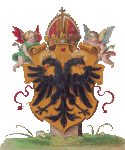

Holy Roman Empire in nummis


The Emperor
Emperor's List
Genealogic Tree
(Fonte: Wikipedia) he emperor had to be male and at least 18 years old, he had to live within the Empire, and was expected to have four quarters of nobility (i.e. all of his four grandparents had to be noble).
he emperor had to be male and at least 18 years old, he had to live within the Empire, and was expected to have four quarters of nobility (i.e. all of his four grandparents had to be noble).
No law mandated that he should be catholic: although many texts took this condition for granted, many lawyers never saw it as a fundamental prerequisite.
Neither did he have to be German, and if fact Alfonso of Castille and Charles V weren’t.
Since the XVII century it became nevertheless customary that the candidate should possess estates within the Empire.
In 1648 the king of France ceded Alsace to the Empire so that he may have the chance to be elected the Kaiser.
The same happened in 1737 to the duke of Lothringen, whom it was allowed to maintain the county of Falkenstein.
The title of emperor was not hereditary, but elective. However between 1453 and 1740, with brief interruptions, the emperor was always a Habspurg.
Executive
He made sure that imperial law was observed, but much was delegated to the Reichskreise.
He nominated the imperial officers.
Legislative
He could propose, approve, promulgate as well as veto laws, but he could not increase taxation without approval.
Judiciary
He was the supreme judge, but could only exercise this prerogative in the courts of justice. He did not have the right of speech in the Reichskammergericht, even though in some cases he did have the last word in the Reichshofrat.
He could grant pardons, bestow exemptions and privileges.
International
He represented the Empire, but the right to sign treaties was quite soon curtailed.
Feudal
He was at the top of the feudal pyramid.







